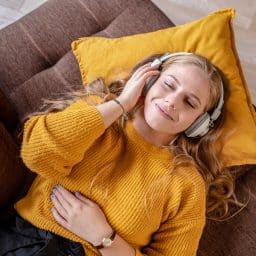
Whether you’re trying to pump yourself up for the gym or relax before bed, you may turn to music to set the mood. Listening to music has many benefits, but it’s important to do so in a way that is safe. We review how loud sounds damage hearing and how to listen safely through headphones and at concerts below.
How Loud Sounds Cause Damage
Inside your inner ear is the cochlea, which is filled with fluid and lined with sensory hair cells called stereocilia. When soundwaves pass through the ears, they move the fluid, which stimulates the stereocilia. This process converts the soundwaves into electrical energy that travels via the auditory nerve to the brain to be interpreted as sound.
When loud sounds pass through the ears, it can damage or destroy the stereocilia, and once damaged, they do not regenerate. The result is permanent sensorineural hearing loss.
How loud is too loud depends on how long you’re listening. The threshold that is generally considered safe is 85 dB—about the volume of highway traffic or a busy café—as long as you’re listening for less than eight hours. For sounds at 100 dB—about the volume of a rock concert—damage can occur in as little as 15 minutes!
How To Listen Safely Through Headphones
The best way to listen safely through headphones is to practice the 60/60 rule: listen for no more than 60 minutes at a time at no more than 60% of the maximum volume.
You can invest in noise-canceling headphones so you can listen clearly in the midst of background noise without having to crank up the volume.
Over-ear headphones are considered safer than earbuds because there is a space buffer between the speaker and your ears, as opposed to earbuds, which deliver sound directly to your ear canals.
How To Listen Safely at Concerts
Next time you attend a concert at USCB of Center of the Arts in Beaufort, make sure you wear hearing protection. Options include:
- Disposable foam earplugs from the drugstore.
- Earmuffs from a sporting goods store.
- Custom musician’s plugs from Charleston ENT & Allergy, which block dangerously loud sounds without sacrificing sound quality.
For more information or to schedule an appointment, call Charleston ENT & Allergy today.
